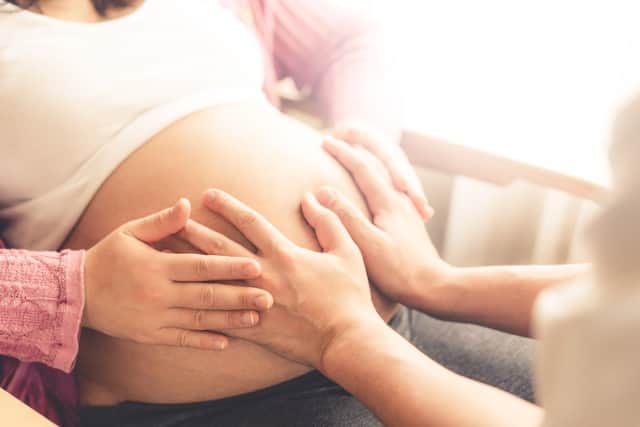Lives of mothers and babies being put at risk due to ‘severe shortage’ of NHS midwives, says RCM
and live on Freeview channel 276
The lives of mothers and babies are being put at risk due to a “severe shortage” of maternity staff, the Royal College of Midwives (RCM) has warned.
Some 500 midwives left the NHS in England last year, on top of a long-term shortage of more than 2,000, according to the RCM.
Advertisement
Hide AdAdvertisement
Hide AdThe organisation, together with UK pregnancy and baby loss charity, Sands, is now calling on the Government to fix the staffing crisis.
Gill Walton, chief executive of the RCM, said: “A serious, persistent and worsening shortage of midwives and other staff is having an impact on the safety and quality of care for women, babies and families.
“Staff are working flat out and doing their best but they are burnt out, fragile and exhausted.
“The demands on them mean they cannot deliver the level of care they so desperately want to and choice for women is being eroded. For many, crisis mode is now the norm.
Advertisement
Hide AdAdvertisement
Hide Ad“This is why many are choosing to simply walk away from the NHS because they know they cannot deliver the right care and for the sake of the own mental and physical health.
“We must see urgent action and investment because services are simply on their knees.”


Sands chief executive, Clea Harmer, added: “Today’s report paints a worrying picture of NHS staff having to make the choice between supporting a bereaved mother or caring for a mother giving birth to a living baby, often rushing between the two leaving no time for personalised, compassionate bereavement care.
“Too often inexperienced midwives are being left on their own to care for bereaved families and this is simply not good enough.”
‘Maternity services are under incredible strain’
Advertisement
Hide AdAdvertisement
Hide AdThis comes as the All-Party Parliamentary Group (APPG) on Baby Loss and Maternity published a report which describes the impact of shortages on neonatal care as “bleak”.
The APPG report states that as well as feeling rushed in their day-to-day duties, midwives often do not have time to offer psychological support to parents in the event of neonatal deaths.
It adds that evidence collected from NHS organisations, midwives and parents “paints a bleak picture of maternity and neonatal services that are understaffed, overstretched and letting down women, families and maternity staff alike”.
The report also said the shortage is also impacting “exhausted and demoralised staff, frustrated at the environment that is not always enabling them to provide care of the safest and highest quality and fearful about making mistakes that could have serious consequences for women and babies”.
Advertisement
Hide AdAdvertisement
Hide AdCherilyn Mackrory MP, Co-Chair of the APPG on Baby Loss, said: “This is a crucial report that highlights the impact staffing shortages on maternity and neonatal care services.
Following on from the Ockenden report, this report affirms yet again that investment is needed to ensure maternity and neonatal services are well staffed and supported so that we deliver the care women and families need.
“I give thanks to all the individuals and organisations who have contributed to the call for evidence and look forward to working with the Baby Loss and Maternity Parliamentary Groups to feed these views into Government.”
Addressing the APPG report, Dr Edward Morris, president of the Royal College of Obstetricians and Gynaecologists, said the findings add to a “growing body of evidence that maternity services are under incredible strain”.
Advertisement
Hide AdAdvertisement
Hide Ad“As a college, we continue to call for the Government to commit to the much needed funding for maternity staffing and training as a priority,” he said.
The authors of the APPG report recommended introducing a “fully funded” settlement for maternity and neonatal services and ring-fencing some of this funding for staff training.
It also advises establishing a national minimum staffing level and that staff are given time to learn from incidents and implement changes.
A Department of Health and Social Care spokesperson said: “Maternity safety is critical and we are making progress to meet our target to halve the rates of stillbirth, neonatal and maternal deaths by 2025.
Advertisement
Hide AdAdvertisement
Hide Ad“We are putting £95 million into the system to recruit 1,200 more midwives and 100 more consultant obstetricians, to ensure we have the staff in place to deliver high-quality, safe care.
“Alongside this, we have invested £127 million into maternity services across the country to boost staff numbers and bolster good leadership and culture and the NHS has developed guidance for NHS clinicians to reduce the risk of baby loss and better monitor pregnancies.”
Comment Guidelines
National World encourages reader discussion on our stories. User feedback, insights and back-and-forth exchanges add a rich layer of context to reporting. Please review our Community Guidelines before commenting.
